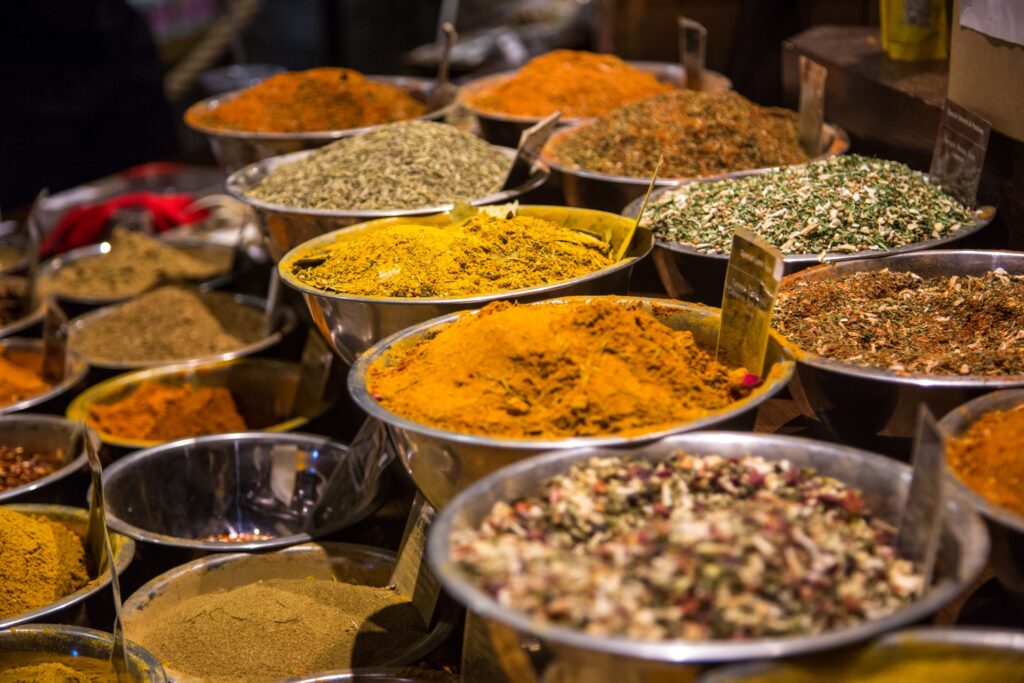A Sufi Follows In the Prophet‘s Footsteps

Sayings of the Prophet
Before listing the foods of the Prophet, it is useful to know some of his manners related to eating.
The messenger of Allah said in Sahih Bukhari:
“The food for two persons is sufficient for three, and the food of three persons is sufficient for four persons.”
“A believer eats in one intestine (is satisfied with a little food), and a kafir (unbeliever) or a hypocrite eats in seven intestines (eats too much).”
“I do not take my meals while leaning (against something).”
“A roasted mastigure (a type of lizard) was brought to the Prophet who stretched his hand towards it to eat it. But it was said to him, “It is a mastigure.” So he withdrew his hand. Khalid asked, “Is it unlawful to eat?” the Prophet said, “No, but it is not found in the land of my people and that is why I do not like eating it.” So Khalid started eating (it) while Allah’s Apostle was looking at him.”
Abu Huraira narrated: “The Prophet never criticized any food (he was invited to) but he used to eat if he liked the food, and leave it if he disliked”.
“There is a tree among the trees which is similar to a Muslim (in goodness), and that is the date palm tree.”
Foods of the Prophet

Barley
Ibn Majah narrated that Aishah (May Allah be pleased with her) said:
“When a member of the family of the Messenger of Allah (May peace and blessings of Allah be upon him) would fall sick, he would order that barley soup is made and then the ill person would be commanded to have some of it. He used to say, `It strengthens the heart of the sad person and relieves the heart of the ill person, just as one of you would wash the dirt off of her face with water.’’’
Barley water is also recommended for coughing and sore throat.
Butter
The Prophet (PBUH) would eat butter and dried dates to neutralize the effect of each other.
Butter is beneficial to remove constipation.
Olive oil and olives
The Prophet (PBUH) said:
“Eat oil and use it as ointment because it is from a blessed tree.”
There are many benefits to olive oil. It helps against poisons, works as a laxative, treats inflammation of the stomach, slows aging…
Dates
The Prophet is reported to have said:
” A house without dates has no food.”
The Prophet (PBUH) ate dried dates with butter, with bread, or alone.
Honey
Allah said:
“And your Lord inspired the bees: “Make your homes in the mountains, the trees, and in what people construct, and feed from the flower of any fruit you please and follow the ways your Lord has made easy for you.” From their bellies comes forth liquid of varying colors, in which there is healing for people. Surely in this is a sign for those who reflect.”
[Quran 16:68-69]
Honey was the favorite drink of the Prophet (PBUH). He used to drink it with water on an empty stomach.
Black seeds
Also called Habbah Sawdaa in Arabic, black caraway, black cumin, Shuneiz in Persian, and kalonji in Hindi— the black seed comes from Nigella sativa, a flowering shrub that grows in Eastern Europe, the Middle East, and Asia.
The Prophet (PBUH) said:
“Use the Black Seed, because it contains a cure for every type of ailment, except for death.’’
The black seed helps against asthma, high blood pressure, diabetes, inflammation, cough, headache, eczema, fever, dizziness, and many other ailments.
Citron
The Prophet (PBUH) said,
“The example of a believer who recites the Quran and acts on it, like a citron which tastes nice and smells nice.”
[Bukhari]
The list of the foods of the Prophet is long. You can find more in the books “Healing with the medicine of the Prophet” or “The book of Sufi healing”.
Sufi healing with Herbal Formulas, Fasting, and Aromatherapy
Herbal Formulas for Common Ailments

The book contains easy to prepare remedies for common ailments like anemia, arthritis, asthma, common cold, burns, colic, diarrhea, cough, constipation, and many more.
Here’s an example of headache remedy:
Formula:
3 teaspoons lavender flowers
3 teaspoons coriander seeds
5 black peppercorns
Preparation:
Grind all ingredients into a fine powder
Dosage:
Take one-half of the dose with water, early in the morning, then rest in bed for 30 minutes.
In the case of a migraine, use this other formula.
Formula:
1/2 teaspoon black mustard seed
Preparation:
Grind with 3 tablespoons water and strain
Dosage:
One drop or two drops in nostrils
Fasting: The Best Medicine

The Difference between Fasting in the West and Fasting in Islam
Fasting has become popular in the West.
The difference between the fast of most Westerners and Muslims is in the intention.
In the West, we fast for health benefits like cleansing the body.
While Muslims can reap the same benefits, the intention, in general, is to earn the pleasure of Allah.
Allah clearly stated in the Quran the purpose of fasting when He said:
“O believers! Fasting is prescribed for you—as it was for those before you—so perhaps you will become mindful of Allah.”
The purpose of fasting is to become God-Conscious.
By restraining ourselves from physical desires, we strengthen our self-control and awareness of God.
Levels of Fasting
The first level of fasting is to restrain oneself from eating, drinking, and sexual desires.
The next level of fasting is what the Sufis call the fasting of the mind. It is considered to be the greatest form of fast.
The one who does it refrain from wrong actions of the hands, sight, mouth, and any other limbs or organs of the body.
Among the wrong actions are useless talk, wasting time, slander, obscenity, listening to forbidden speech, and so on so forth.
The Sufi prefers to remain silent, to remember God constantly, and to break the fast with the minimum amount of food required.
Each one of Allah’s prescriptions has a dual impact.
Fasting affects the soul and helps in its evolution.
On the other hand, the impact on the body is undeniable.
As we said before, most diseases are the result of incomplete indigestion.
Fasting raises the temperature of the body, allowing to process the excess matters and to eliminate any harmful substances.
There’s a great blessing in fasting. Allah who made us, knows better what is good for us.
Aromatherapy in Sufism

The Origin of Aromatherapy
The Sufis believe that the soul of flowers- their essence- comes from the soul of the prophecy.
The 124 000 prophets Allah sent to the world have the same soul. Regardless of their physical appearance or place of birth, they had the same message.
The knowledge on how to extract the souls from flowers was taught to the Prophets and preserved by the Sufis.
So the essence of flowers has an invaluable healing property.
The symbol of Sufism is Rose. It’s considered to be the Mother of Scents and the Queen of the Garden.
How a Sufi uses Flowers and Essential Oils
The Sufis use flowers in many ways to maximize the healing benefits.
For example, they place rose petals on a tomb of a saint and collect them later to use in healing. The soul of the saint will affect the soul of the flowers increasing the healing power.
Another way is to recite verses of the Quran over rose petals, charging them with healing properties.
The Sufis have also two methods of using essential oils.
The most common application is on the right hand, wrists, beard, chin, and across the front shirt.
The second method is administrated in the case of mental or emotional conditions.
Apply one or two drops of essential oil on a cotton swab. Then put it into the right ear, just above the ear opening (not inside). This particular point is considered to be one of the life-regulated points.
In Chinese acupuncture, they call it Shen Men, also known as Divine Gate. It is so powerful that it treats almost everything–stress, anxiety, depression, inflammatory diseases, etc.
In the Sufi tradition, the soul has different stages- the stages of egotism, heart, soul, divine secret, and proximity. Each station has its own imbalances and required the proper oil to be used. I’ll expand on this in the next section.
The Evolutionary Stages of the Soul
The Stations of the Soul from a Sufi Perspective

For the Sufi, the soul occupies different stations through life from birth to death.
A station is called maqam in Arabic, which means a stopping or resting place.
There are six stations listed in ascending order.
Maqam an-Nafs: The Station of Egotism
Every person is born into this station. At this stage. we are preoccupied with our physical needs.
While it’s normal for an infant to be at this station- the faculty of reason and judgment are not fully developed, it becomes problematic for an adult to remain at this stage.
Many physical and emotional ailments are the result of the endless focus on body desires.
Maqam al-Qalb: The Station of the Heart
For the Sufi, any transformation begins in the heart.
People at this stage feel good about themselves and others. They want to spread goodness in the world. They also love nature and accept everyone.
Despite the positive aspect of this station, the one occupies it is not free from disease. But still, the nature of the ailments is less severe than for the previous stage.
Maqam ar-Ruh: The Station of the Pure Spirit
It is hard for an individual to get to this stage without a shaykh (a guide).
Through various practices, one can develop better self-discipline and capacities of mercy and compassion.
The one in this station appears to others as a person of great love and spirituality.
Imbalances are possible at this stage when we don’t control perfectly the appetite of the body.
Maqam as-Sirr: The Station of Divine Secrets
The spirit of this stage is encapsulated in the hadith of the Prophet (PBUH) when he said:
” …And the most beloved things with which My slave comes nearer to Me, is what I have enjoined upon him; and My slave keeps on coming closer to Me through performing Nawafil (praying or doing extra deeds besides what is obligatory) till I love him, so I become his sense of hearing with which he hears, and his sense of sight with which he sees, and his hand with which he grips, and his leg with which he walks.”
[Al Bukhari]
The one in this station can understand the whole universe and how it works.
Few physical or emotional imbalances remain at this level. The effect of the ego is none.
Maqam al-Qurb: The Station of Proximity to Allah
The one at this stage has glimpses into the next world and the world of other created forms.
The perception of reality is totally different at this level.
Most shaykhs agree that this station is undesirable.
To get that close to God comes with the risk of getting divinely intoxicated.
Maqam al-Wisat: The Station of the Union
This is the stage of the beloved friends of God.
Personal efforts are not enough to reach this level. Only Allah chooses whom to admit.
People at this station have no concern about this world or their physical needs.
The only physical ailment remaining is the one preceding death.
Ailments Associated with each Station

The closest you get to God, the fewer ailments you have.
The Station of Egotism
The Station of Egotism is the one that has the most ailments.
The emotional diseases linked to this level are fearfulness, anxiety, self-doubt, depression, sexual perversion, paranoia, and suicide.
On the physical side, most of the degenerative diseases are at this level. The results of staying in this station are drug abuse, alcoholism, obesity, criminal behavior, heart attack, venereal diseases, and cancer.
The Station of the Heart
At the station of the heart, the ailments diminish in intensity. But still, it’s just the second level of the soul’s progress, so many diseases remain.
At the emotional level, the one in this station can suffer from the fear of failure, excessive emotions, lack of concentration, inconsideration for others’ feelings, severe anger, self-importance, and hypocrisy.
Losing friends is something common at this level. As the person ascending to the station of the heart, many in the entourage cannot accept the changes they see.
On the physical side, the body is going through a cleansing process to get rid of the harmful matters cumulated during the prior station.
The ailments can be headache, nausea, diarrhea, aches, pains, skin eruption, and fever.
These ailments are not pleasant but beneficial. The body is going through self-treatment.
The Station of the Pure Spirit
In the blessed station of the soul, the worst of the imbalances is arrogance.
The one in this station can feel better than others and tend to condemn them.
The other emotional problems include pride, degrading others, self-deception, and selfishness.
These imbalances happen when the appetites of the body are not totally controlled.
On the physical side, one can suffer from fatigue, fever, or auto-intoxication from excessive breathing exercises.
The Station of Divine Secrets
At the station of divine secrets, there are no more egotistical desires.
The main imbalances are irrationality, false interpretation of divine phenomena, lack of interest in worldly life, heart pain, heart-burning, difficulty in breathing, and sometimes, a sense of suffocating.
To reach this station requires years of breathing exercises that, if done excessively or incorrectly, lead to imbalances.
The Station of Proximity to Allah
At the station of Proximity, there’s no physical ailment. The greatest risk is to disbelief in God.
How is it possible after reaching this level of closeness?
Well, attributing divinity to oneself can happen. And that’s disbelief.
The Station of the Union
Arriving at the Station of the Union, there are neither physical ailments nor emotional or spiritual ones.
How a Sufi Move from One Station to the Next One?

It is important to remember that, for the Sufis, you can’t leap several stations above or ahead. Up or down, it’s always one station at a time.
Also, you can’t lower your guard at any stage. The risk to fall back is always present.
From Ego to Heart
The first station is definitely the most dangerous.
Everything needs to be done to leave this level.
The progress of the soul starts with self-discipline. The one in this stage needs to develop willpower, responsibility, and compassion.
Also, the Sufis use perfumes and essential oils for various ailments like rose, jasmine, and frankincense.
From Heart to Pure Spirit
It is difficult to move to the station of the Soul without a guide. One must perfect self-discipline and develop the capacities of mercy and compassion.
To help the body cleansing itself, the Sufi can use amber, musk, rose, sandal, or violet.
From Pure Spirit to Divine Secrets
To reach the stage of divine secrets, one must remember God, practice breathing, and divine recitations.
The use of Oud (a costly oil extracted from the aloeswood tree), henna, or sandal can help with the few imbalances.
From Divine Secrets to Proximity
The station of proximity requires years of breathing practice.
For a Sufi, the main breathing exercise in the Holy Quran recitation.
The Quran has up to 11 levels of recitations employing different levels of difficulty.
You can have a glimpse of this when you try to follow your favorite shaykh just to find yourself quickly out of breath while he’s still reciting for 2 minutes using one single breath!
No physical imbalances remain at this stage. For the few spiritual ones, the Sufis use amber or rose.
From Proximity to Union
The last stage requires the permission of God. There are no imbalances left to heal.
